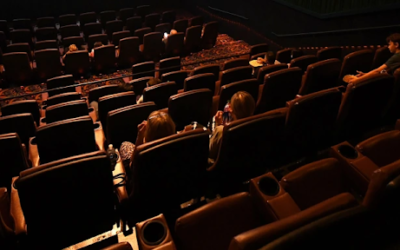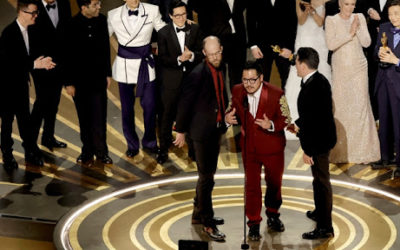Source: The Hollywood Reporter
Whenever a well-known celebrity or industry figure is arrested and later convicted of a crime, one would expect said crime to be something of an abhorrent nature. For example, Harvey Weinstein, once one of the most prominent studio executives working in Hollywood, was found guilty of sexual assault and various other sex-related crimes just a couple years ago, and most would agree that the conviction was much needed and appreciated. However, it’s not uncommon for a filmmaker to be accused of crimes that many would say are not really crimes at all. In these situations, it’s less of a situation where the filmmaker did something wrong more than it is a situation where they did something the government did not approve of, regardless of how harmless others may deem such actions. Though such occurrences may not be all that common in the United States and other nations that are more supportive of freedom of speech, the same cannot be said in countries with strict censorship laws that can lead to harsh punishment if they are not adhered to. The nation of Iran is one such country where media censorship is strictly enforced, and one such filmmaker who has found himself in conflict with the Iranian government is Jafar Panahi, who has actually managed to gain a considerable amount of acclaim elsewhere in the world for his works.
Making his cinematic debut in 1995 with “The White Balloon”, which garnered the Camera d’Or at the 1995 Cannes Film Festival, Jafar Panahi quickly gained a reputation as Iran’s best-known filmmaker. Several other films from Panahi would follow, including 2000’s “The Circle”, which won the Golden Lion at that year’s Venice Film Festival, and “Offside” in 2006, which was awarded the Silver Bear at the Berlin Film Festival. Although these films have received overwhelming praise from overseas critics and audiences, the Iranian government has had a less than favorable reaction to Panahi’s work. Much of the subject matter explored in these films, including censorship, poverty, sexism, and violence among others, goes against what the government has declared to be acceptable, and it has repeatedly chosen to act accordingly against Panahi. Banning these films was among the first decisions made in order to suppress any presence of Pahani’s work in Iran, but the filmmaker has continued to fight back, and just recently, such conflict has reached a point where he must now serve a prison sentence.
On Tuesday, July 19th, the judiciary of the Iranian nation announced that Jafar Panahi would be forced to spend six years in prison, carrying out a sentence that had been delivered over a decade ago yet had not been properly enforced until now. As claimed by judiciary spokesman Masoud Setayeshi, Panahi has been charged and convicted for producing what has been referred to as “anti-government propaganda”, and that the sentence should have begun in 2011 when the verdict had first been delivered.
Panahi’s sentence may not have been enforced until now, but he has been banned from international travel for over ten years as a result of his charges. That has not prevented him from making more films though, albeit in secrecy. These underground films have managed to fly under the radar of the Iranian government and released internationally, resulting in them being just as critically acclaimed (if not more so) than some of Panahi’s previous works. Among these films are “This is Not a Film”, a 2011 documentary constructed in the form of a video diary (said to have been smuggled out of Iran on a flash drive hidden in a cake), and “Taxi”, which won the Golden Bear at the 2015 Berlin Film Festival and various others festival awards. Panahi’s most recent films have likewise been well-received by critics and festival-goers, with “3 Faces” winning Best Screenplay at the 2018 Cannes Film Festival (an award accepted by Panahi’s daughter Solmaz), and his latest work, the anthology film “The Year of the Everlasting Storm”, being among the lineup of the 2021 Cannes Film Festival.
Enforcement of Panahi’s prison sentence did not begin until just last week when the filmmaker visited the prosecutor’s office in Tehran (the nation’s capital) to ask about the cases involving Mohamad Rasalouf and Mostafa al-Ahmad, two other Iranian filmmakers that have struggled with the Iranian government over their works. Rasalouf and al-Ahmad had been arrested earlier in July, accused of speaking out on social media against the government’s violent response to protests in Iran’s southwestern region, and in doing so, supposedly undermining national security. It did not take long for Panahi himself to be arrested, and it wasn’t too long afterwards that the judiciary decided now was the time for him to carry out his six-year prison sentence.
As of this writing, Panahi has been detained in Evin Prison, and is currently expected to remain there for the next six years. Various human rights groups have been quick to speak out against Panahi’s imprisonment, drawing attention to not only the Iranian government’s mistreatment of the country’s world-renowned film industry, but also its mistreatment of protestors and activists in general. The nation certainly has a lot to deal with right now, from the possible crash of its national currency to the potential revival of its nuclear program, which several world powers are currently divided as to whether or not they should allow it to happen. An economic crisis looms over the nation of Iran, and the last thing it needs is the rest of the world looking down on it for the way it treats its people, especially its filmmakers.
If there is one positive thing to take away from all of this though, it’s the fact that it proves just how powerful the art of cinema can be. Most governments are well aware of how influential films can be on their people, which is why they are so eager to enforce censorship and ensure whatever is shown doesn’t go against its personal values. This is what makes some filmmakers, Jafar Panahi included, come across as so brave and daring, as they are willing to fight against these strict standards in order to make the films they desire to make. They may be subjected to unjust punishment for doing so, but to them, it’s worth it if it means getting to create the art they are so passionate about.




